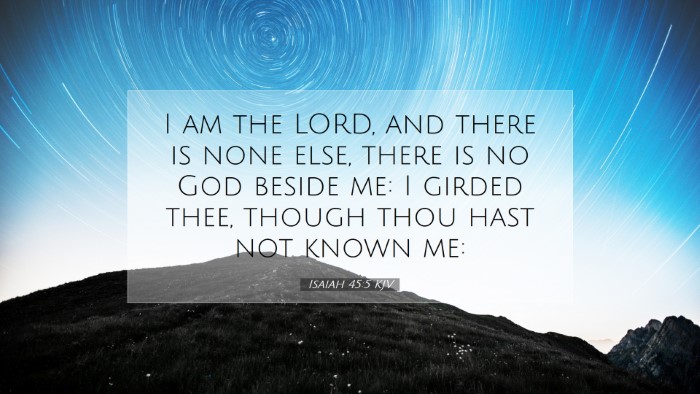Commentary on Isaiah 45:5
Isaiah 45:5 (KJV): "I am the LORD, and there is none else, there is no God beside me: I girded thee, though thou hast not known me."
Context and Overview
The book of Isaiah is a profound prophetic text that addresses Israel and the nations, focusing on themes of judgment, redemption, and the sovereignty of God. Chapter 45 mark a pivotal point where Israel, in the context of exile, is reminded of God's unique position as the Creator and Redeemer.
This specific verse is a declaration from the Lord regarding His divine sovereignty, emphasizing both His exclusivity as God and His intimate involvement in human affairs, even among those who do not acknowledge Him.
Exegesis of Isaiah 45:5
1. The Lord's Declaration of Sovereignty
In the phrase "I am the LORD, and there is none else," we see a profound declaration that underscores God's uniqueness. As noted by Matthew Henry, this statement is foundational in biblical theology, asserting the monotheistic essence of God. The Lord declares His identity not only to Israel but universally, indicating that all other claimed deities are mere fabrications.
2. The Affirmation of No Other God
The insistence "there is no God beside me" reiterates God’s unparalleled nature. Albert Barnes highlights that this assertion serves both as a comfort to the faithful and a warning to the idolaters; it establishes the truth that no other gods hold power or agency in the affairs of men.
3. The Unrecognized Divine Influence
The phrase "I girded thee, though thou hast not known me" presents an interesting dynamic regarding human acknowledgment of God. Adam Clarke comments on God's providential care for Cyrus, the Persian king, who was used to fulfill God's purposes despite his ignorance of the true God. This reveals the complexity of God's sovereignty wherein He operates through individuals who may not recognize Him, yet achieve His divine plans.
Theological Implications
1. The Exclusivity of God
This verse sets a clear position that God stands alone in divinity. The Christian doctrine asserts that there is one God existing in three persons: the Father, the Son, and the Holy Spirit. This exclusivity compels believers to affirm their faith in the one true God, aligning with Matthew Henry’s assertion regarding the rejection of idolatry and false gods.
2. God's Sovereignty in History
Isaiah’s mention of God girding Cyrus illuminates the concept of divine sovereignty in history. Throughout the Bible, God uses secular rulers to fulfill His purpose, demonstrating His overarching control. Albert Barnes brings attention to how God’s sovereign plan often operates independently of human acknowledgment, calling scholars to consider how God’s purposes unfold across time, even in seemingly ordinary events.
3. The Concept of Grace
This verse also reflects the grace of God, as He actively girded Cyrus for His mission, despite Cyrus not knowing Him. Adam Clarke emphasizes that this shows God's grace can extend to all of humanity, leading them toward God's purposes regardless of their initial relationship with Him.
Practical Applications
1. Confidence in God's Sovereignty
For pastors and theologians, this verse encourages an unwavering confidence in God’s control over worldly events. In uncertain times, believers are called to remember that God is actively working through history, much like He did with Cyrus, to achieve His redemptive purposes.
2. A Call to Acknowledge God's Presence
Believers are urged to actively seek God's presence and recognize Him in their lives. The reminder of God's action despite human ignorance prompts reflection on how often one might miss God's movement due to lack of awareness. Matthew Henry emphasizes the importance of intentionality in recognizing God's workings in the everyday.
3. Engaging with the World
Understanding that God can use anyone for His mission allows Christians to engage more fully with the world. Albert Barnes elucidates this point, advocating for Christians to view non-believers not merely as adversaries but as potential instruments in God's sovereign plan, prompting believers to seek opportunities for evangelism and dialogue.
Conclusion
Isaiah 45:5 is a profound reminder of God's absolute sovereignty, the uniqueness of His nature, and the assurance of His presence orchestrating the affairs of humanity. For pastors, students, and theologians, it calls for a deeper appreciation of God's unyielding authority and grace that can be at work in individuals regardless of their awareness. Engagement with this verse encourages believers to both trust in God's ultimate control and actively seek His presence in their lives and the world around them.


